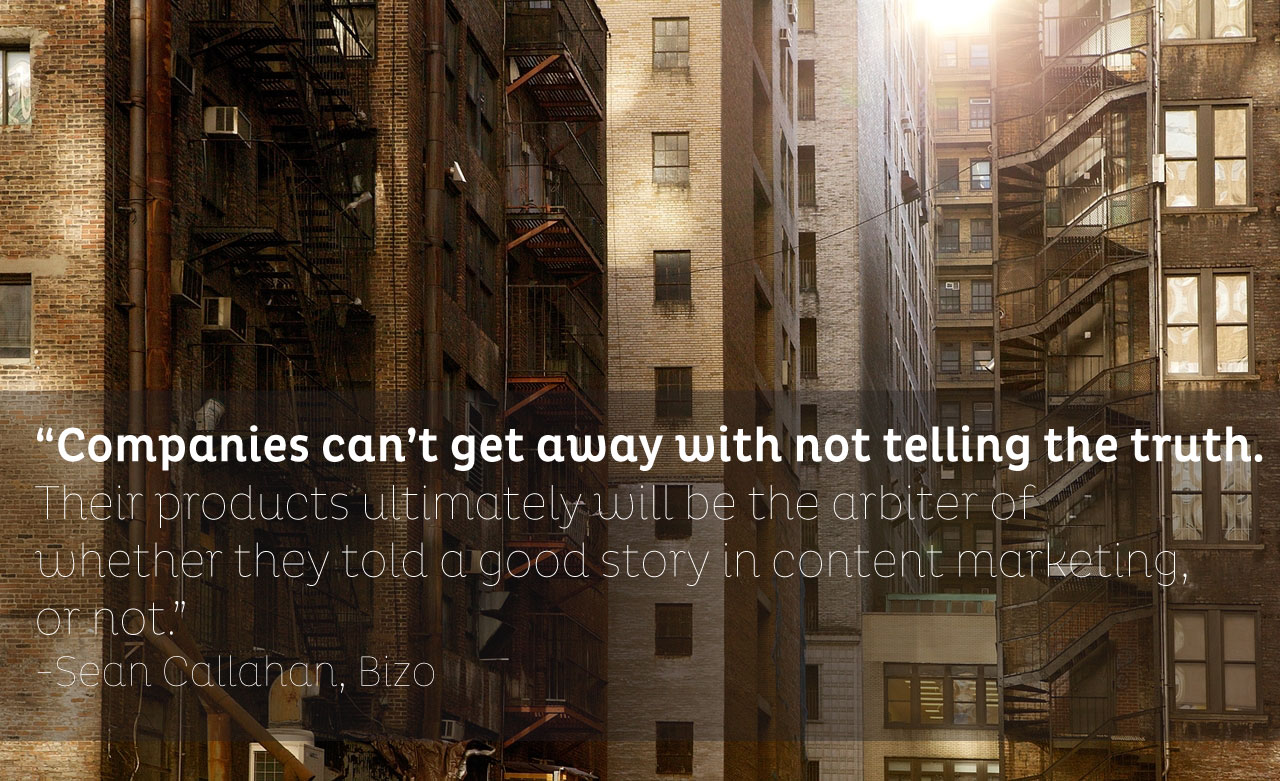
Back in journalism school, professors ingrained one particular piece of “age-old” wisdom in our brains. It went something like this: reporters who work outside of newspapers have “sold out to the dark side.” Don’t do it.
Going corporate meant forgetting ethics, integrity, and accountability. The worst fate for an honest reporter.
But the state of the journalism industry has shaken. And for some modern journalists—especially those who’ve weathered the turbulence of the news industry over the past decade—that “age-old” professorial wisdom isn’t so true anymore.
Going corporate meant forgetting ethics, integrity, and accountability.
Such is the case for Sean Callahan, editor and marketing director for Bizo, a San Francisco-based ad technology company. Bizo’s data management and targeting technology helps B2B marketers reach prospects online through display and social advertising. Their company serves clients such as Microsoft, AT&T, and Salesforce.com.
Callahan believes, in many cases, corporately produced content results in better, more relevant, and more compelling news stories than content produced by traditional media outlets.
“Vendors can tell their story better directly than they could through an objective third party,” Callahan said.
Callahan oversees Bizo’s blog and is one member of a content team of three. Together their team is responsible for a content cadence of 40+ blog posts per month for their 2014 marketing strategy.
And he’s not exactly a tyro in the world of writing. Callahan spent the last two decades in journalism, starting as a reporter in Chicago’s South Side for Daily Southtown (now known as the Southtown Star) in 1995, where he regularly pumped out three or four stories per week.
Now Callahan manages Bizo’s two blogs: the Bizo Blog (which captures business-related news) and the Digital Marketing Remix blog (which is a B2B industry blog that features tips of the trade, practical advice, and best practices). Both are designed to provide relevant information to key target markets and eventually drive revenue. They are a central hub to the company’s 12.1K Twitter followers and Facebook fans.
But the two blogs also produce great “journalism.”
“There are certain things magazines can do well,” Callahan said. “They are objective, they can cover the news.” But marketers want to actually know how this stuff works, and it’s the practitioners, especially in marketing, who can tell that story best, Callahan says.
Not only do marketers know how to write, but their hands are deep into their “beats,” providing a deeper, more contextual level of content.
Ethical standards of truth and accuracy are upheld simply because consumers will start seeing through brands that misrepresent themselves through corporate content.
And relevancy is maintained by corporate ROI benchmarks. In other words, if your content isn’t relevant to your audience, your audience won’t engage, your business won’t generate more sales, and content marketers would lose their jobs.
Consumers will start seeing through brands that misrepresent themselves through corporate content.
As a result, some content producers are surpassing traditional reporters in covering top B2B news. Meanwhile, traditional journalists are paying attention and respecting organic content conduits, like Twitter (ex: CNN’s partnership with Dataminr).
Of course, not everyone is convinced that content marketing is the new Fourth Estate. Roughly 40% of people don’t trust online content as accurate, according to a Nielsen study, and consumers (sometimes rightly) get concerned when media giants like Google, Facebook, and SnapChat breach privacy standards and leak personal information.
Nevertheless, content is king. And as the industry morphs, content marketing could (at least) be a fraternal partner of our nation’s democratic press in B2B news. With the main difference being that a marketer’s salary is dependent on the health of a corporation, rather than the health of newsprint advertising.

